Civil Rights Cases Attorney
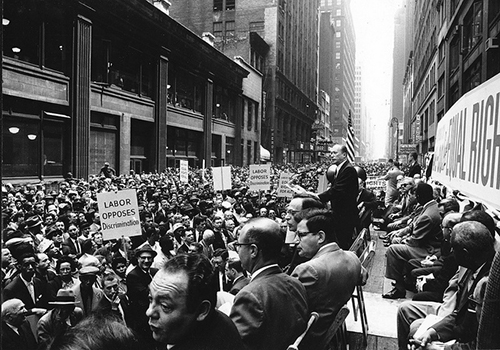
In the United States, you are guaranteed certain rights by the U.S. Constitution. That same document provides the foundation for a free, fair, and just society. The rights, liberties, and protections found in the Constitution are taken very seriously in America, particularly when they are violated. If your civil rights have been violated by an employer, an individual, or a governmental agency, you may have remedies available under the law
At the Law Offices of Adam M. Thompson, P.C. we understand the personal, and often sensitive, nature of a civil rights violation. We are committed to zealously defending your civil rights and aggressively pursuing a claim against anyone who has violated them. If you have suffered a civil rights violation in New York City, please contact our firm now by calling 855-497-2326 or by filling out our contact form. Our firm is proud to represent individuals throughout New York State and New Jersey.
What should I do if I am the victim of a civil rights violation? Click here for more information.
Types of Civil Rights Cases
The U.S. Constitution guarantees you a number of civil rights. Unfortunately, any of those civil rights could be violated by an individual, an employer, a company, or a governmental actor. Some of the more common types of civil rights cases we handle include:
- Employment discrimination — The law is clear: an employer cannot discriminate on the basis of protected characteristics such as age, race, ethnic background, national origin, religion, disability, marital status, or sex. Individual state laws often provide additional protected classes such as "gender" (gender identity). An employer who makes hiring, firing, or promotional decisions based on any of these characteristics is in violation of the law.
- Discrimination in housing and/or public accommodations — It is illegal for privately owned facilities that offer food, lodging, gasoline or entertainment to the public to discriminate on the basis of the same protected classes (age, race, ethnic background, national origin, religion, disability, marital status, or sex). Likewise, you cannot be discriminated against when applying for public housing or other state or federal benefits on the basis of a protected characteristic.
- False arrest or imprisonment — If a defendant in a criminal case believes that he or she was falsely arrested and/or is being falsely imprisoned, a lawsuit may be filed in civil court. Known as a "Section 1983" case after the applicable federal statute (42 USC 1983), these cases require a defendant to prove that he was wrongfully convicted or that he was arrested but acquitted, or that the charges were dropped.
- First amendment freedoms — The First Amendment to the U.S. Constitution provides for freedom of religion, speech, and of the press, as well as the right to assemble and to petition the government for redress of grievances. There are a virtually endless number of ways in which one, or more, of these freedoms can be violated.
- Police misconduct or excessive force — While law enforcement officers are frequently required to use physical force to restrain a suspect and/or protect the public, the law does not allow the force used to be excessive. Moreover, law enforcement officers are not exempt from the laws they enforce. In fact, both federal and state laws specifically protect citizens from an over-zealous police force. For example, federal law makes it a crime "for one or more persons acting under color of law willfully to deprive or conspire to deprive another person of any right protected by the Constitution or laws of the United States." [Emphasis added] The "color of law" may refer to a law enforcement agency or any other situation wherein power has been granted by the government. It is also illegal for State or local law enforcement officers to "engage in a pattern or practice of conduct that deprives persons of rights protected by the Constitution or laws of the United States." These (and other) laws are often used in a civil rights lawsuit based on police misconduct or excessive force.
How Civil Rights Cases Are Different than Other Civil Litigation
Although civil rights lawsuits are handled in civil court, there are a number of procedural rules that cause civil rights cases to stand apart from other civil lawsuits. Often, failing to understand and follow these procedural steps can result in forever losing the right to pursue your claim. For example, when a government actor is named as a defendant, a special notice must be filed with the appropriate agency within a relatively short period of time after the incident or injury that led to the complaint. Failing to file this required notice can forever bar you from pursuing a claim. In addition, government actors often have "immunity" that must be considered when evaluating a civil rights violation. The key to a successful civil rights lawsuit is having an experienced civil rights attorney on your side from the beginning.
A violation of your civil rights can cause lasting damage. Civil rights claims are legal in nature, but deeply personal at heart. At the Law Offices of Adam M. Thompson, P.C. we understand how important a civil rights case is to everyone involved, which is why we are dedicated to standing behind a victim throughout the often lengthy process of seeking justice. Contact us today by calling 855-497-2326 or by filling out our online contact form.
Civil Rights In The News
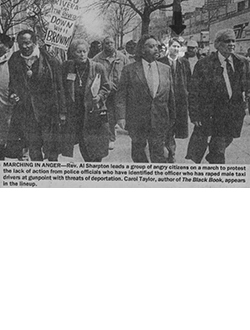
Civil Rights Case—Marching in Anger
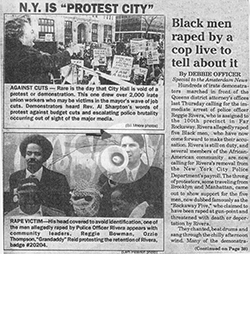
Civil Rights Case—Black Men Raped by a Cop Live to Tell About It
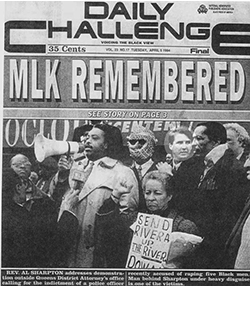
Civil Rights Case—MLK Remembered
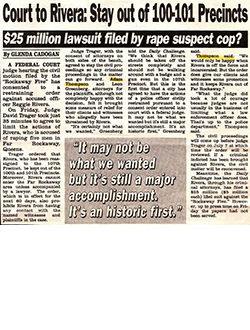
Civil Rights Case—Court to Rivera: Stay out of 100-101 Precincts
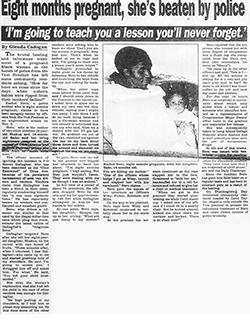
Civil Rights Case—Eight Months Pregnant, She's Beaten by Police
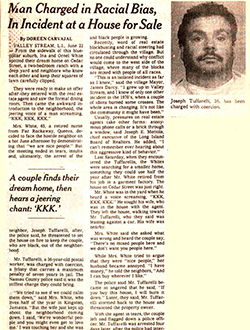
Civil Rights Case—Man Charged in Racial Bias, In Incident at a House For Sale
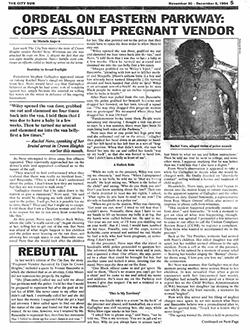
Civil Rights Case—Ordeal on Eastern Eastern Parkway: Cops Assault Pregnant Vendor

Civil Rights Case—NFA Grad Shot Dead by NYC

Civil Rights Case—NYC Cops: NFA Grad Shot After Holding Girl, Menacing

Civil Rights Case—Hate Words Bring Fed Indictment
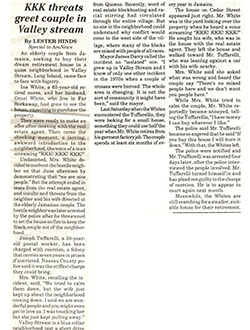
Civil Rights Case—KKK Threats Greet Couple in Valley Stream
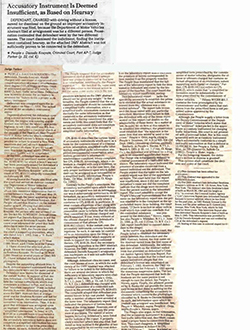
Civil Rights Case—Accusatory Instruments is Deemed Insufficient, as Based on Hearsay
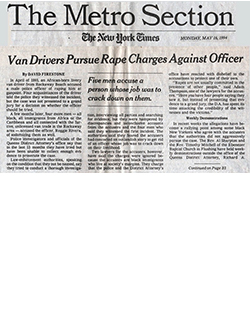
Civil Rights Case—Van Drivers Pursue Rape Charges Against Officer
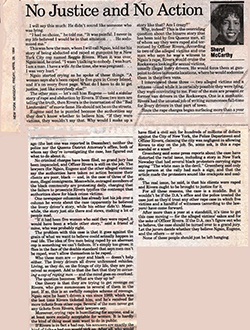
Civil Rights Case—No Justice and No Action

Civil Rights Case—Racist Threats Hurled at Black Couple
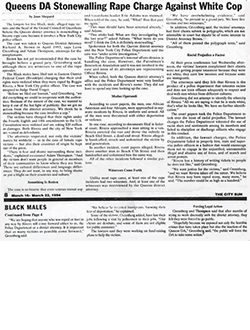
Civil Rights Case—Queens DA Stonewalling Rape Charge Against White Cop
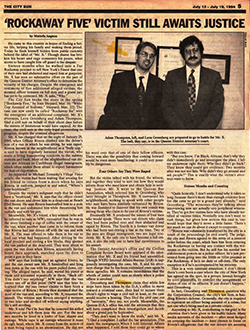
Civil Rights Case—Rockaway Five" Victim Still Awaits Justice
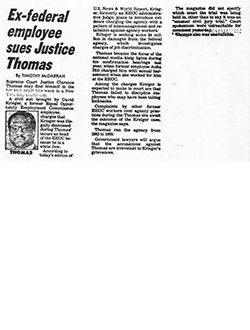
Civil Rights Case—Ex-Federal Employee Sues Justice Thomas
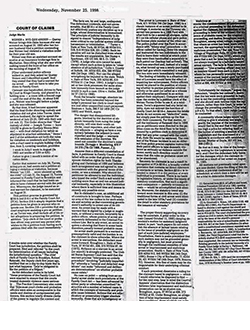
Civil Rights Case—Court of Claims
Testimonials
Raw Law
- Am I Allowed to Represent Myself in My New York DWI Case? Why Should I Hire an Attorney?
- Can I Do a Treatment Program in New York City?
- Can I Use Mouthwash to Avoid DWI in New York City?
- Can the Police Search Your Home Without a Warrant in New York?
- Do You Know Your Rights?
- Do You Need a Lawyer before You're Charged?
- DWI Stop -- How Do I Respond When Asked If I Have Been Drinking?
- Free Report: Who will be on the Jury for my Criminal Jury Trial in New York?
- Free Report: Are You Eligible for Drug Court in New York?
- Free Report: Constructive Possession in New York - What It Is and Why It Matters
- Holiday DWI Checkpoints in New York
- How Can I Get Evidence Thrown Out or Suppressed in New York?
- How Can You Defend Someone You Know Is Guilty?
- How Long Can I Go to Jail for Selling Drugs in New York?
- How Much Will a DWI Lawyer Cost in New York City?
- How Often Do Medical Errors Occur?
- If a Police Officer Asks You to Take a Field Sobriety Test What Should You Do?
- I Was Caught Smuggling Drugs – Will I Go to Federal Prison?
- I Was Notified of a Probation Violation Hearing in New York. Do I Need an Attorney?
- My Lawyer Told Me to Refuse the Chemical Test in New York, Is that Right?
- New York Construction Sites Accidents: Fatalities and Safety Violations [Infographic]
- Penalties for Alcohol and Drug-Related Driving Violations in New York [infographic]
- Should I Take a Breathalyzer Test in New York?
- Should I Talk to the Police or Prosecutor after I am Arrested in New York or New Jersey?
- The Crime of Rape in the State of New York
- Top Five Mistakes Defendants Make in a New York DWI Case
- Types of Medical Errors
- What Are Pre-Trial Hearings?
- What Are the Penalties for Possession or Sale of Marijuana in New York?
- What Are the Possible Defenses to a DWI Charge?
- What Are the Possible Defenses to New York Sex Crimes Charges?
- What Are the Possible Defenses to the Sale of Drugs in New York?
- What Are the Possible Penalties for Drug Possession in New York?
- What Are the Possible Penalties for DWI in New York?
- What Behavior and Patterns the Police Look for When Searching Out Intoxicated Drivers
- What If the Police Didn't Read Me My Rights before Arresting Me for DWI in New York?
- What Is a Line-Up and Show Up?
- What Is a Misdemeanor DWI in New York City?
- What Is an Arraignment In New York?
- What Is an Illegal Search in New York?
- What Is a Search and Seizure in New York?
- What Is a Sentence Enhancement in New York?
- What Is a Wrongful Death Case?
- What Is Boating While Intoxicated in New York?
- What Is Constructive Possession?
- What Is the HGN Test?
- What Is the Officer Looking For When the Officer Asks Me to Follow a Pen Light?
- What Is the Punishment for Possession of Cocaine in New York City?
- What Is the Punishment for Possession of Oxycodone in New York City?
- What Takes Place at a Criminal Trial?
- Who Will Be on the Jury for My Criminal Jury Trial in New York?
- Will I Be Drug Tested in Court in New York?

